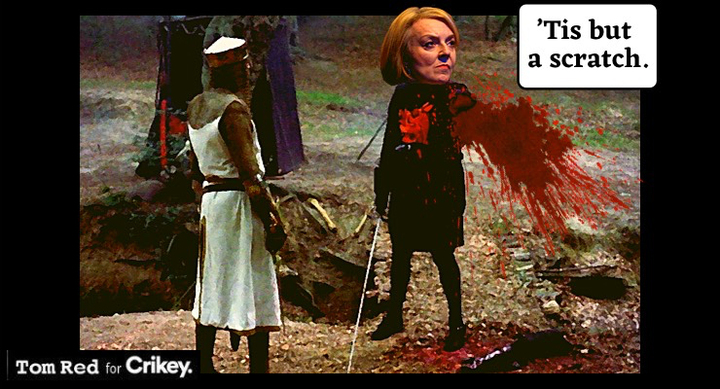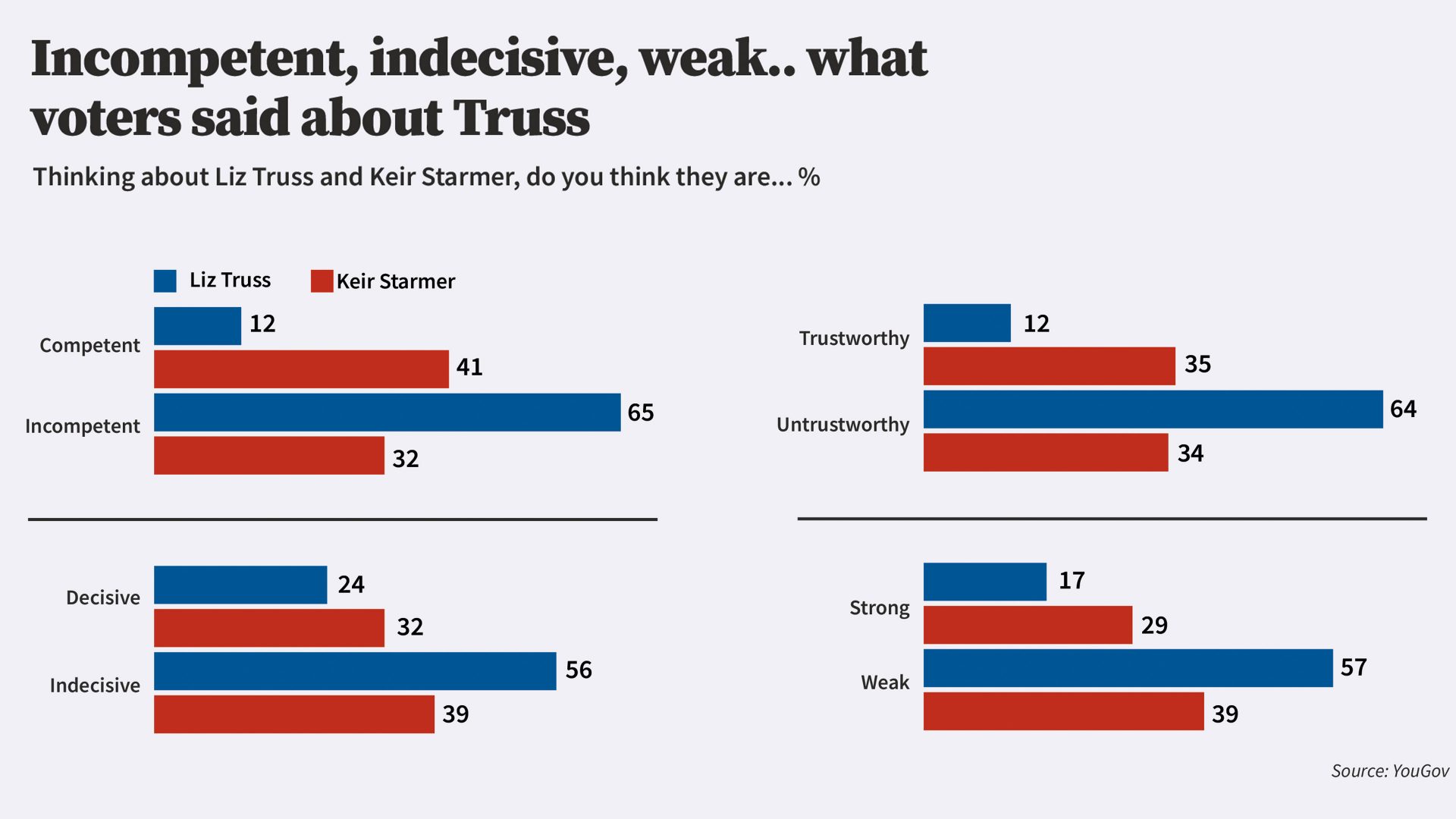
Politics is a harsh game, particularly for women, and so — regardless of ideology — it’s hard to suppress a flash of fellow-feeling when you see a female PM battling the odds: Mrs Thatcher in the Commons on the day of her resignation, growling “I’m enjoying this!” as she swatted away her antagonists; a beleaguered Theresa May performing a game, jerky boogie to “Dancing Queen” as she ascended the Tory conference podium; and then, at the start of October, Liz Truss on that same stage, emerging from the screaming chaos of her own mini-budget to the hopeful strains of “Moving On Up”.
When the music stopped, however, the chaos recommenced, and with it the sense of lurching anxiety around Truss’s premiership. How to describe this surreal episode in our political history? It began with the death of a widely beloved monarch of 70 years’ standing and went rapidly downhill thereafter. The “fiscal event” that the new PM and her former chancellor, neighbour and friend Kwasi Kwarteng unleashed upon Britain — borrowing billions for tax cuts — sent mortgage interest rates soaring, pension funds to near-collapse, and temporarily crashed the pound.
King Charles met Truss for their first weekly audience with the lamentation “Dear oh dear”. Last Friday was particularly eventful, including a U-turn over corporation tax and her request for Kwarteng’s resignation as chancellor, to be replaced by Jeremy Hunt. In the uneasy, truncated press conference which followed, reporters asked why she didn’t resign, too. She looked half-stunned, trapped in a bad dream, and sadly repeated her comfort word — “growth” — but the magic had leaked out of it. As the afternoon collapsed around her, the Twitter meme factory grew red-hot.
If Truss has often seemed dazed by the fallout from her own policies, so is the British public. They hardly knew the PM, and it was the opposite of “you had me at hello”, but more as if a stranger had entered the house and muttered a cursory greeting before taking out a rifle and blasting the fusebox. At the heart of Truss’s troubles has been a problem not solely related to policy, but something even more likely to determine political survival: instinct. She appears to lack it. Although she was born in Oxford, grew up in Paisley and then Leeds, and attended Oxford University, she has displayed frighteningly little understanding of what makes her countrymen and women tick.
Not only did her conference speech contain little emotional or historical resonance, it also offered an unusually sparse sense of who she was. Truss briefly mused on stalled growth: the “boarded-up shops” of her childhood in Paisley and Leeds in the 1980s and ’90s (years which, until 1997, encompassed an unbroken period of Conservative government). There was a distant whiff of feminist struggle, as she remembered being given a “junior air hostess” badge as a child on a plane while her brothers got “junior pilots”. But otherwise, Truss has essentially remained a mystery to us, a riddle in a bodycon dress.
Previous prime ministers have been, if not universally popular, then at least recognisable as some kind of English archetype. Margaret Thatcher was a blend of mummy, nanny and Elizabeth I; Tony Blair an energetic guitarist in a Christian rock band who proved surprisingly ruthless about contract negotiations. Even Gordon Brown was a Scottish PM as imagined through English eyes: a dour son of the manse, canny with the housekeeping money. This image was so powerfully entrenched that hardly anyone seemed to notice his wilder moments, such as flogging off half of Britain’s gold reserves at the bottom of the market.
In more recent years we’ve had David Cameron with his lightly pin-striped soul, an unflappable member of a category that might be dubbed “posh wide boy”; Theresa May, the buttoned-up, suburban neighbour with whom you would happily entrust a set of keys; and Boris Johnson, a boisterously amoral, priapic squire from Merrie England. Such personae carry inevitable risks: in the case of Johnson, especially, the characteristics that once triggered electoral dopamine in England had entirely the reverse effect in Scotland. But they at least brought some sense of being knowable.
If England hasn’t been able to make sense of Truss, however, she has seemed equally perplexed by it in return, almost wilfully deaf at every turn to the country’s moods and yearnings. A desperate winter looms, with forecasts of high inflation, an NHS crisis and possible energy shortages. People are deeply worried, particularly those on lower incomes; there is a palpable desire for the government to signal that this is a shared struggle in which the vulnerable will not be left to flounder alone.
Even Tory MPs not normally famed for their sensitivity, such as Jacob Rees-Mogg, grasped this to some degree: he and other Conservatives pushed for benefit payments to rise in line with inflation, and a national campaign on how best to conserve household energy. Truss expressed resistance to both policies, partly on the grounds that she was opposed to the “nanny state”. Yet when the door’s ajar and the shadow of the intruder falls across the bed, it’s surely preferable to have Nanny in the vicinity than no one at all.
While withholding reassurance, the PM instead insisted, often, on telling the public what she wanted: to grow the pie of GDP. This British pie was to be grown by US methodology, involving low taxes, multiple sweeteners for wealthy investors, and a bonfire of all remaining EU regulations. Truss was deliberately hazy on how or when the new, giant pie would be shared out, because she said arguments about distributing a “limited pie” had dominated the debate “for too long”.

The vision came attached to a serious flaw, however, once again to do with the sensibilities of an English electorate, many of them long-time Tory voters. Having barely been conceptualised, Truss’s pie seemed eager to enlarge itself by devouring things that many people hold dear, in particular our natural heritage. It demanded much more than four-and-twenty blackbirds to feel replete; in fact, to many conservationists, it looked more like the voracious plant in The Little Shop of Horrors.
Truss’s government had plans to get rid of environmental regulations on water quality and chemical pollution, and loosen planning restrictions. Much-vaunted new “investment zones” were to be rendered exempt from rules protecting wildlife habitats. There was talk of scrapping a post-Brexit scheme to pay farmers for helping our depleted nature to recover, and of lifting the moratorium on fracking.
If this was ecologically dismaying, it was also politically insane. Shortly before Truss became PM, all shades of UK opinion were already united in disgust upon discovering the extent to which raw sewage has been regularly pumped into our seas and rivers. Poorly regulated capitalism did not emerge well from a closer examination of events: water companies had paid out large sums to shareholders and to senior executives, rather than investing in their crumbling infrastructure. The effect of the scandal was to place the public on high alert to profit-driven environmental degradation.
While a careful Conservative case might well have been made for combining growth and conservation, that’s not what Truss did. Instead, the government’s bullish rhetoric galvanised a number of leading conservationist charities in unprecedented outrage. The RSPB, a charity with 1.2 million members, united with the National Trust and the UK branch of WWF to create a “people’s plan” against what they called “an attack on nature”. Tony Juniper, the head of the watchdog Natural England, pointedly warned that “even bankers need to eat, drink and inhale clean air”.
In signs that she was ready for a scrap, Truss labelled all who dissented from her agenda as “the anti-growth coalition.” She perhaps took on more than she understood. To radicalise l’Angleterre profonde — something more deep-rooted in the land even than Middle England — is a reckless act for any politician, particularly one without a popular mandate. These opponents were the birdwatchers; the dog-walkers, hikers and ramblers; the foragers and jam-makers; the keepers of bees and hedgerows. Many have long been conservatives with a small “c”, in the vanishing belief that the party had an impulse towards conservation.
Some party grandees, such as William Hague, explicitly warned Truss of the dangers of her course, decrying the “huge uncertainty” that had been created around British nature. But that looming battle over the natural world has been postponed, because political mayhem has hijacked Truss’s career before it reached there.
Growth, growth, growth, she chanted. Having made the markets her only gods, in the name of some distant but golden payoff, it turned out the PM had badly miscalculated how best to appease them. They sampled her array of sacrifices, and spat them out with force. Only more, different sacrifices would placate them, and — even as Truss and Hunt struggled to dismantle her altar — it became apparent that she, and perhaps even her party, might be among them.








Truss showed one brief flash of real insight when she began as PM and tweeted she was,
Truss looks like the result of a tradition in the Tory Party to ensure that each leader is significantly worse than the last, perhaps as a way to give the departing leader the comfort of not being the worst in living memory. It is clear enough that Johnson backed Truss against Sunak because he reckoned her time in office would tend to make his look better in comparison. The horror underlying all this is that although there is so much attention on whether Truss will go soon, the real problems of the UK run much deeper, the whole Tory Party is implicated, it has no credible solutions and it still has nearly two years in government unless it removes itself.
Truss is an ogre whose only ambition is to create her own legend. If this anti-environment, anti-welfare, anti-anyone earning under a hundred thousand quid careerist is the best that the Conservative Party can come up with, then bring on Labour. Or even the flat earth society.
Very good piece.
Two things about Jeremy Hunt. One, he came last in the first round when Tory MPs started voting for a new leader. Two, he is neither nominally nor practically in charge of the UK given the financial markets have, er, taken back control. As the Guardian’s inimitable Marina Hyde points out, “I really don’t want to think of Jeremy [Hunt] as a chess grandmaster whose moves are being dictated by the markets via vibrating anal beads. But since I have, you must too.”
Marina Hyde is always right on the UK government’s case, as is John Crace.
I often mutter about Malcolm Turnbull as my internet drops in and out. But I try to remind myself that he did help to bring Guardian Australia to us. And we would not have had marriage equality passed under either Abbott or Morrison since neither holds a supporting view of SSM.
Brexit was the sound of the stable door slamming shut after the horse had bolted. And Truss is the headless chook running out from under the door.
As Liz Truss blurts her neoliberal gibberish that makes sense only in neoliberal media the actual impact of this stripping of checks and balances is laid bare.
Until there is a logic and credibility test for media output the insanity will prevail, control of information outlets is more powerful and influential than democratic process.